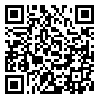Volume 28 - Supplementary
IBJ 2024, 28 - Supplementary: 158-158 |
Back to browse issues page
Download citation:
BibTeX | RIS | EndNote | Medlars | ProCite | Reference Manager | RefWorks
Send citation to:



BibTeX | RIS | EndNote | Medlars | ProCite | Reference Manager | RefWorks
Send citation to:
Shabani M, Heidarimoghadam R, Faradmal J, Babamiri M. Enhancing Personnel Selection and Job Performance of Emergency Medical Personnel through Fuzzy Delphi Technique: Identifying Key Cognitive Abilities. IBJ 2024; 28 :158-158
URL: http://ibj.pasteur.ac.ir/article-1-4581-en.html
URL: http://ibj.pasteur.ac.ir/article-1-4581-en.html
Abstract:
Introduction: Cognitive abilities play a vital role in selecting personnel. The main objective of this study was to utilize the Fuzzy Delphi method to screen and identify cognitive skills specifically designed to meet the complex and diverse needs of emergency medical services. This approach acknowledges the broad spectrum of non-technical (mental) abilities and skills required of emergency medical personnel.
Methods and Materials: This qualitative study employed the Fuzzy Delphi approach in five consecutive stages, including defining a problem, conducting a systematic literature review, implementation the Fleishman questionnaire, comparing the cognitive requirements extracted from the first and second stages, and Implementing the Fuzzy Delphi model. These stages were utilized to prioritize and select the most essential skills. The panel of experts was divided into two groups: one consisting of small matter experts (SMEs) and the other of cognitive specialists.
Results: All of the SMEs were specialists in emergency medicine, with an average of 17 years of experience in emergency services. The expert panel comprised cognition specialists with knowledge and expertise in ergonomics (50%) and work and organizational psychology (50%). The average number of years of experience in the field of cognitive science was eight years. The final results of the Fuzzy Delphi analysis showed that decision speed, decision-making, problem diagnosis sensitivity, situational awareness, selective attention, mental flexibility, signal detection, and peer monitoring were the most important factors.
Conclusion and Discussion: Our findings suggest that continuous improvement and greater efficiency in emergency situations and workplace complexity can be achieved by strengthening these cognitive abilities in selecting and promoting emergency medical personnel.

Methods and Materials: This qualitative study employed the Fuzzy Delphi approach in five consecutive stages, including defining a problem, conducting a systematic literature review, implementation the Fleishman questionnaire, comparing the cognitive requirements extracted from the first and second stages, and Implementing the Fuzzy Delphi model. These stages were utilized to prioritize and select the most essential skills. The panel of experts was divided into two groups: one consisting of small matter experts (SMEs) and the other of cognitive specialists.
Results: All of the SMEs were specialists in emergency medicine, with an average of 17 years of experience in emergency services. The expert panel comprised cognition specialists with knowledge and expertise in ergonomics (50%) and work and organizational psychology (50%). The average number of years of experience in the field of cognitive science was eight years. The final results of the Fuzzy Delphi analysis showed that decision speed, decision-making, problem diagnosis sensitivity, situational awareness, selective attention, mental flexibility, signal detection, and peer monitoring were the most important factors.
Conclusion and Discussion: Our findings suggest that continuous improvement and greater efficiency in emergency situations and workplace complexity can be achieved by strengthening these cognitive abilities in selecting and promoting emergency medical personnel.

| Rights and permissions | |
 |
This work is licensed under a Creative Commons Attribution-NonCommercial 4.0 International License. |







.png)
